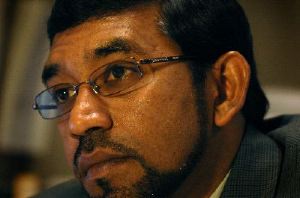How has Muslim-American life changed?
Oct 18
By MATT GALNOR; The Times-Union
Five years ago Monday, terrorist attacks in
Those attacks also changed attitudes and actions toward Muslim-Americans, says Parvez Ahmed, national chairman of the Council on American-Islamic Relations.
Ahmed, an assistant professor of finance at the
In the five years since Sept. 11, do you think Muslim Americans are treated differently than they were right after the terrorist attacks?
Yes. It has become progressively worse.
How so?
Number one, there is an increased attack on Islam through airwaves and through rhetoric. Talk-show hosts, commentators, even the president, have used very negative ways of describing Islam – and Muslims. For example, using “Islamic fascism” and things like that. It has linked our faith to something that is very negative, almost universally rejected, like fascism. … [According to a CAIR report on the state of Muslim civil rights to be released this week] the numbers show that, again, since 9/11, the reports of discrimination, the reports of profiling, the reports of law enforcement overreach continue to increase at an alarming rate.
When the president says something like he did last month about Islamic fascism, does that lend credibility to people discriminating?
Yes. … Most people will not delve into the nuances behind what the president meant and why Muslims are upset about it. … They will just look at the rhetoric and they will simply perceive that Islam is related to fascism or fascism is inspired by Islam. If that’s the way we use this terminology, when we say Islamic art, we meant art that is inspired by the teachings of Islam. When we say Islamic ethics, we mean ethics that are inspired by the teachings of Islam. When somebody says Islamic fascism, at least that’s the way I interpret it and that’s the way most Muslims would interpret it, is that they are meaning to say that fascism is inspired by Islam. … That creates a perception in the Muslim mind that the war on terror is actually a war on Islam.
On that topic, what’s one thing you would change in the
First of all, there is no one thing to change … it’s a much more complex problem.
Is there one thing that stands out?
Yes. The one thing that stands out is the mere absence of diplomacy and dialogue with the mainstream Muslim community, both at home and abroad. … In other words, what has happened since 9/11 is that the administration’s policy has exclusively focused on security measures and military means to tackling terrorism … and while that is necessary, just exclusively doing that is not going to win the war on terror. It has to be augmented; it has to be supplemented with other things. And that other thing is sustained dialogue and diplomacy with mainstream Muslim communities at home and abroad.
What do you say when you when you visit schools in
First of all, I talk about the commonalities of faiths. That our faith traditions – whether Christianity, Judaism or Islam – they have common roots. Abraham was the patriarch of all three religions; it’s based on monotheism – worship of one God. It is based on common values. The Ten Commandments are part of not only Judaism and Christianity, they are part of Islam, too … the values espoused in the Ten Commandments. So, in other words, Islam is not any strange faith. It’s a faith that is very close to Christianity and Judaism; it’s just a misunderstood faith, for a variety of reasons.
Do you see things getting better in the next five years?
It can only get better if certain things happen.
Such as?
… [I]nteraction from the Muslim community, the outreach program by the Muslim community, a sustained dialogue with other faith groups and a political outreach by our leaders to the Muslim community – and vice versa. If all those things happen, then I’m hopeful the next five years will be much better than the previous five years.
matt.galnor@jacksonville.com, (904) 359-4550
This story can be found on Jacksonville.com at http://www.jacksonville.com/tu-online/stories/091006/met_changes.shtml.

